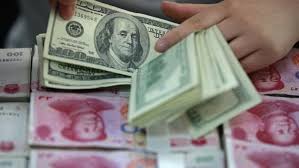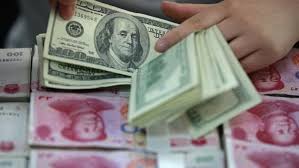
A congressional panel charged with monitoring security and trade links between Washington and Beijing said that U.S. lawmakers should take action to ban China’s state-owned firms from acquiring U.S. companies.
The Chinese Communist Party has used state-backed enterprises as the primary economic tool to advance and achieve its national security objectives, said the U.S.-China Economic and Security Review Commission in its annual report to Congress.
By changing the mandate of CFIUS, the U.S. government body that conducts security reviews of proposed acquisitions by foreign firms, Congress should prohibit U.S. acquisitions by such entities, the report recommended.
"The Commission recommends Congress amend the statute authorizing the Committee on Foreign Investment in the United States (CFIUS) to bar Chinese state-owned enterprises from acquiring or otherwise gaining effective control of U.S. companies," the report said.
CFIUS now has veto power over acquisitions from foreign private and state-controlled firms if it finds that a deal would threaten U.S. national security or critical infrastructure and it is led by the U.S. Treasury and with representatives from eight other agencies, including the departments of Defense, State and Homeland Security.
A blanket ban on U.S. purchases by Chinese state-owned enterprises would essentially be created by the panel’s recommendation if enacted.
As President-elect Donald Trump’s transition team is formulating its trade and foreign policy agenda and vetting candidates for key economic and security positions, the panel's report could carry extra weight this year even though it is purely advisory.
After Republicans managed to retain control of both the House and the Senate in last week's election riding on U.S. voter sentiment against job losses to China and Mexico, Congress also could be more receptive.
Grabbing headlines with his pledges to slap 45 percent tariffs on imported Chinese goods and to label the country a currency manipulator on his first day in office, Trump strongly criticized China throughout the U.S. election campaign.
"Chinese state owned enterprises are arms of the Chinese state," Dennis Shea, chairman of the U.S.-China Economic and Security Review Commission, told a news conference.
"We don't want the U.S. government purchasing companies in the United States, why would we want the Chinese Communist government purchasing companies in the United States?"
One of 20 proposals the panel made to Congress was the recommendation to change laws governing CFIUS. A government investigation into how far outsourcing to China has weakened the U.S. defense industry was called for by it on the military side.
Any move by the U.S. Commerce Department to declare China a "market economy" and limit anti-dumping tariffs against the country would require the approval of the 16-year-old panel and it said that Congress should pass legislation to this effect.
According to Thomson Reuters data, a record $64.5 billion worth of deals, more than any other country targeted by Chinese buyers, was made between buyers from mainland China and the United States and U.S. businesses this year.
Chinese companies this year has seen a record $200 billion worth of deals, nearly double last year's tally and the push into the United States is part of a global overseas buying spree by Chinese companies.
(Source:www.cnbc.com)
The Chinese Communist Party has used state-backed enterprises as the primary economic tool to advance and achieve its national security objectives, said the U.S.-China Economic and Security Review Commission in its annual report to Congress.
By changing the mandate of CFIUS, the U.S. government body that conducts security reviews of proposed acquisitions by foreign firms, Congress should prohibit U.S. acquisitions by such entities, the report recommended.
"The Commission recommends Congress amend the statute authorizing the Committee on Foreign Investment in the United States (CFIUS) to bar Chinese state-owned enterprises from acquiring or otherwise gaining effective control of U.S. companies," the report said.
CFIUS now has veto power over acquisitions from foreign private and state-controlled firms if it finds that a deal would threaten U.S. national security or critical infrastructure and it is led by the U.S. Treasury and with representatives from eight other agencies, including the departments of Defense, State and Homeland Security.
A blanket ban on U.S. purchases by Chinese state-owned enterprises would essentially be created by the panel’s recommendation if enacted.
As President-elect Donald Trump’s transition team is formulating its trade and foreign policy agenda and vetting candidates for key economic and security positions, the panel's report could carry extra weight this year even though it is purely advisory.
After Republicans managed to retain control of both the House and the Senate in last week's election riding on U.S. voter sentiment against job losses to China and Mexico, Congress also could be more receptive.
Grabbing headlines with his pledges to slap 45 percent tariffs on imported Chinese goods and to label the country a currency manipulator on his first day in office, Trump strongly criticized China throughout the U.S. election campaign.
"Chinese state owned enterprises are arms of the Chinese state," Dennis Shea, chairman of the U.S.-China Economic and Security Review Commission, told a news conference.
"We don't want the U.S. government purchasing companies in the United States, why would we want the Chinese Communist government purchasing companies in the United States?"
One of 20 proposals the panel made to Congress was the recommendation to change laws governing CFIUS. A government investigation into how far outsourcing to China has weakened the U.S. defense industry was called for by it on the military side.
Any move by the U.S. Commerce Department to declare China a "market economy" and limit anti-dumping tariffs against the country would require the approval of the 16-year-old panel and it said that Congress should pass legislation to this effect.
According to Thomson Reuters data, a record $64.5 billion worth of deals, more than any other country targeted by Chinese buyers, was made between buyers from mainland China and the United States and U.S. businesses this year.
Chinese companies this year has seen a record $200 billion worth of deals, nearly double last year's tally and the push into the United States is part of a global overseas buying spree by Chinese companies.
(Source:www.cnbc.com)





